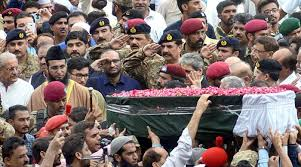
Islamabad, July 10: Abdul Sattar Edhi, the founder of one of Pakistan’s largest public welfare charities, has become the first Pakistani in more than a quarter of a century to be honoured with a state funeral.
Edhi, believed to be in his early nineties, died of kidney failure in a Karachi hospital on Friday night having become increasingly frail in recent years.
Abdul Sattar Edhi runs a sprawling health charity from a Karachi slum, but that doesn’t stop the religious right condemning him for not saying his prayers
The pomp and military ceremony of his funeral at Karachi’s national stadium on Saturday was in stark contrast to the famously humble style of the man who only owned two sets of clothes and lived in a windowless room next to his small office in a Karachi slum.
From there, Edhi and his family ran a massive nationwide enterprise that relies almost entirely on public donations to sustain hundreds of medical centres, maternity wards, orphanages and women’s shelters.
More than 1,200 minivan ambulances ply the country’s roads, always seeming to reach the scene of the country’s frequent terrorist attacks within moments, while thousands of people owe their lives to the Edhi Foundation taking in abandoned babies who otherwise would have been left to die.
Nawaz Sharif, Pakistan’s prime minister, said the country had “lost a great servant of humanity”.
“He was the real manifestation of love for those who were socially vulnerable, impoverished, helpless and poor,” he said. “This loss is irreparable for the people of Pakistan.”
Sharif announced a national day of mourning and a state funeral, the first time anyone has been so honoured since General Zia ul-Haq, the military dictator who died in a plane crash in 1988.
“If anyone deserves to be wrapped in the flag of the nation he served, it is him,” Sharif said.
Although the prime minister remained in London following heart surgery last month, the funeral was attended by most of Pakistan’s ruling elite.
Edhi’s body was wrapped in Pakistan’s green and white flag and honoured with a gun salute by the army. Afterwards he was due to be buried at the Edhi Village, a shelter on the outskirts of the city for the mentally ill, older peaople and abandoned women.
In a final act of modesty, his family said he had insisted on being buried in the clothes he died in. He offered his organs for donation, although only his cornea was healthy enough for transplantation.
As a young man, Edhi first moved to Karachi from Gujarat in India just six days after Pakistan was formed as an independent, Muslim-majority state.
It was in the port city that his charity empire first emerged in the 1950s when, appalled by the suffering he saw around him, he established small drug dispensaries.
In 1957, his efforts shifted up a gear when he established a makeshift hospital to take care of the victims of flu epidemic that had ripped through the city.
He bought his first ambulance in 1965 in the wake of a war with India in which Karachi was bombed. He took it upon himself to collect up body parts of dead civilians and organise dozens of funerals.
“My heart became so hard after that,” he told the Daily Times in 2009. “I made humanity my religion and devoted my life to it.”
Despite its scale and complexity, Edhi and his wife, Biquis, always remained at the helm of the lightly managed organisation, often answering emergency calls himself or heading out in one of his ambulances to the scene of disasters.
that plague Karachi would spare his vehicles emblazoned with the red Edhi lettering.
The nation was shocked in October 2014 when armed men robbed his office while he was in bed. The £400,000 of stolen cash was soon replaced by donations.
In a country increasingly afflicted by sectarianism and religious intolerance, Edhi won praise for caring for anyone who needed help, with many Pakistanis arguing he should have been recognised with a Nobel prize.
His open-mindedness earned him the distrust of some hardliners and militant groups that have increasingly sought to set up their own welfare organisations modelled on the Edhi Foundation.
In a 2015 interview with the Guardian, Edhi dismissed his critics on the religious right who have smeared him as an infidel who will not be granted access to heaven. “I will not go to paradise where these type of people go,” he said. “I will go to heaven where the poor and miserable people live.”

